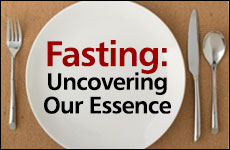 Iran’s Attack on Israel
Iran’s Attack on Israel


5 min read
6 min read
6 min read
5 min read
4 min read
Fasting enables us to discover what is truly important to us.
Fasting always seemed so counterproductive to me. Most of the Jewish fast days commemorate catastrophes which occurred in our distant past. When tragedies occur, we are taught to mourn and understand the loss, and to correct the mistakes which begat them. We must look into ourselves and repent the faults which cause such tragedy to be.
But fasting seems so counterproductive. It makes us weak and listless, in no shape to do the heavy introspection required for true self-improvement. If repentance is truly the goal of the day, why not keep our productivity at its optimum, setting aside a day for contemplation and self-examination? We should be picking ourselves up and repenting – doing something about our faults. Instead we starve ourselves, so that by the end of it we‘d rather nap than introspect.
Further, is moping around, feeling sad about past calamities the Jewish way? Isn’t Judaism a religion of positive doing, of working to correct our flaws rather than sitting around feeling bad about them?
My teacher Rabbi Yochanan Zweig once had the very difficult experience of visiting a woman in the final stages of terminal illness – who sadly, looked as bad as her prognosis. What do you say to such a person? How can you reassure her, cheer her up, make her feel positive about so hopeless a situation? And so even the seasoned rabbi he is, he entered her hospital room only with the utmost of uneasiness.
To his surprise, the woman he visited was not only content and accepting of her fate. She was glowing. She exuded a joy and a happiness with life rarely found among the healthy.
During the course of the visit, Rabbi Zweig found the guts to ask her what he felt he just had to ask: How was she able to be so happy and positive in her condition? How did she overcome the apparent sadness of her situation to become so full of life and vitality?
She answered, in essence, as follows: “Now that I have nothing else in life, I know what is truly important to me. Beforehand, I had a happy life – a good husband, wonderful kids, a good career, a high standard of living. I wanted for nothing. But now I really have a relationship with my husband and children. I have become so much greater a person, so much more appreciative of who I am and what God has granted me. My past life was a wonderful dream, but I could have lulled myself through the entire thing, never truly finding out who I am inside.”
And then, almost to his own surprise, the rabbi asked her an even more pointed question: “Do you feel it was worth it, that it was better that God gave you this illness than had He left you in your previous life?”
She answered without hesitating: “Yes, it is much better today, how I am now going to return my soul to my Creator.”
When we fast, we undergo the same experience in a much more benign way. Denying ourselves food and drink helps us strip away our outer layers – and recognize what is truly important to us. During the rest of the year it is easy to fool ourselves. What do we live for? Is that delicious steak lunch I was looking forward to what truly gives me happiness in life?
But when we live without such creature comforts, we can look deeper. What really gives meaning to my life? What is really important to me? When enjoying the superficial, we can distract ourselves with that. But when we must do without, we can see through it all and recognize what is truly significant to us.
By denying the physical, we recognize that at our root we are spiritual people.
Thus, the first step towards repentance is to fast. We minimize our physical pleasures – the things we usually think make us enjoy life. This is in part to mourn the loss. But it is also serves to help us reorder our priorities – to strip away the auxiliary and understand what life is all about. By denying the physical, we recognize that at our root we are spiritual people. Creature comforts are only a means towards our happiness, not our goal.
Later, after this basic message sinks in, we can do the real heavy repentance work. We can carefully analyze our behavior and figure out what we do right and what needs improvement. But the first step is to know ourselves, to look beneath all the comforts and superficialities we so often occupy ourselves with – and to figure out just whom we truly are.
